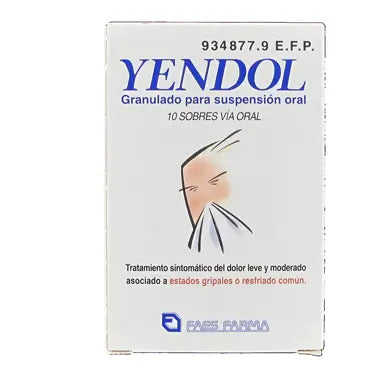Granulated sachets for the relief of catarrhal and flu-like symptoms with fever, pain and runny nose.
Contains 10 sachets.

It is a medicine used for the relief of symptoms in catarrhal and flu-like conditions with fever, mild or moderate pain, headache and runny nose.
It comes in a pack containing 10 sachets.
Suitable for use in adults and adolescents over 16 years of age.
Take 1 sachet every 8 hours. Do not exceed the maximum of 5 sachets every 24 hours.
Do not use Yendol:
In children under 16 years of age.
If you are allergic to paracetamol, salicylamide, chlorphenamine, caffeine or any of the other ingredients of this medicinal product (listed in section 6).
If you have ever had allergic reactions when taking acetylsalicylic acid, xanthines (such as aminophylline, theophylline, etc.), any non-steroidal anti-inflammatory drugs (medicines used to relieve inflammation, pain and reduce fever) or a dye called tartrazine.
If you are under 16 years of age, as the use of salicylates (such as salicylamide) has been linked to Reye's syndrome, a rare but serious condition.
If you have chronic or recurrent ulcers in your upper intestine (duodenal ulcer) or stomach (gastric ulcer).
If you have a history of bleeding (blood loss) or gastric perforation following treatment with aspirin, salicylamide or other non-steroidal anti-inflammatory drugs.
If you have asthma or nasal polyps associated with asthma that are induced or exacerbated by aspirin.
If you suffer from blood clotting disorders such as haemophilia (blood clotting defect) or hypoprothrombinaemia (abnormal decrease in the amount of prothrombin in the blood, predisposing to bleeding), among others.
If you have severe kidney and/or liver problems (severe kidney and/or liver failure).
If you suffer from any liver disease (with or without liver failure) or viral hepatitis, as this increases the risk of hepatotoxicity of paracetamol.
If you are being treated with medicines to prevent blood clotting (oral anticoagulants).
If you are in the third trimester of pregnancy.
Stop taking this medicine and consult your doctor if you notice blood in your stools or vomit, or if you are very tired, as these may be symptoms of stomach bleeding.
Particular attention should be paid to the simultaneous use of this medicine with other medicines containing any of its active substances.
Yendol sachets may cause side effects, as with all medicines. This does not mean that all people will experience side effects. Specifically, the following have been observed
Very common side effects:
drowsiness (feeling sleepy), dizziness and muscle weakness, facial dyskinesia (presence of abnormal and involuntary movements in the muscles of the face), motor incoordination, tremor, paraesthesia (tingling sensation in the skin),
blurred vision, diplopia (double vision),
dryness of the nose and throat, thickening of mucus,
dry mouth, loss of appetite, alterations in taste or smell, gastrointestinal discomfort (nausea, vomiting, diarrhoea, constipation, epigastric pain) which can be reduced by taking the medicine with food,
increased sweating,
urinary retention or difficulty urinating.
Adverse effects of unknown frequency:
blood dyscrasias (blood disorders) which may occur with symptoms of haemorrhage (bleeding), sore throat or tiredness,
hypersensitivity reactions, acute anaphylactic or allergic reaction (coughing, difficulty swallowing, palpitations, itching, swelling of eyelids or around the eyes, face, tongue, dyspnoea, tiredness), photosensitivity,
paradoxical excitement (characterised by restlessness, insomnia, trembling, nervousness, delirium, palpitations and even convulsions), especially at high doses and in children or the elderly,
tinnitus (perception of ringing or buzzing noises in the ear), acute labyrinthitis (inflammation of the inner ear),
irregular heartbeat (cardiac arrhythmias, palpitations, tachycardia), usually with overdose,
hypotension, hypertension, oedema (swelling),
tightness in the chest, wheezing (high-pitched, whistling sounds that occur during breathing when the airways are partially blocked),
cholestasis (stopping bile from flowing into the duodenum), hepatitis or other liver function disorders (with stomach or abdominal pain, dark urine, etc.),
impotence, early menstruation.
Refer to the package leaflet of this medicine for more information on possible side effects. Reactions associated with paracetamol, caffeine, salicylamide or chlorphenamine may occur:
The active substances in Yendol Sachets are: paracetamol, salicylamide, chlorphenamine maleate and caffeine anhydrous. Each sachet contains 200 mg paracetamol, 500 mg salicylamide, 3 mg chlorphenamine maleate and 30 mg caffeine anhydrous. The other excipients are: citric acid monohydrate, saccharin sodium, sucrose, sodium lauryl sulphate, orange flavouring and quinoline yellow colouring (E-104).
This medicine is available in granulated sachets with a slight orange flavour. It is a very useful option for improving the symptoms of colds, and can be taken after the main meals with a little juice, water or milk.
A healthy diet with adequate protein and vitamin intake is recommended.
Read the package leaflet included with this medicine carefully. If you have any questions, you can consult our team of expert pharmacists.
The prices of non-prescription medicines are set by law. In our online pharmacy you can buy this medicine at a discount of 10%, which is the maximum allowed by law.
